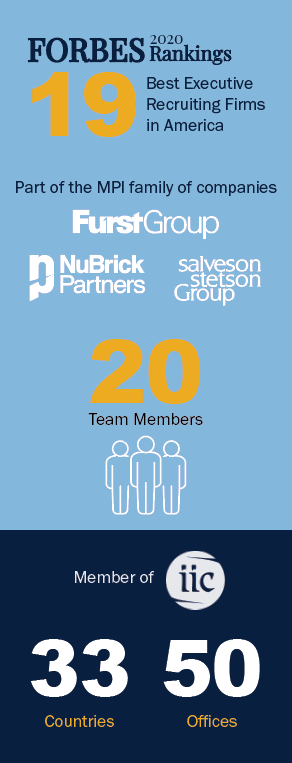Menu
2021 Survey Report
CHROs and Top Executives
There’s no doubt the pandemic will leave a significant imprint on the way people work for years to come, according to new research by Salveson Stetson Group. Our 2021 “Return to Office” survey follows up on responses from a similar survey conducted toward the start of the pandemic to answer new questions and gauge changes in how executives and employers plan to re-enter the workplace.
This new study surveyed 118 human resource professionals and 364 executive level employees from March 18 to April 4, 2021 and covers a broad range of topics regarding the impact of the pandemic on employment, work environment and talent.
This report presents the survey data and trends gathered from respondents as well as our analysis and insights. The sample came from distributing the survey to more than 12,000 executives and CHROs in our extensive network who are actively engaged in a variety of industries across the nation. Respondents to the survey self- selected from a direct invitation to respond.

According to our survey, nearly 73% of respondents said that before the pandemic they worked on-site or in the office, but since the pandemic, almost 88% of respondents say they work remote or a mix of remote and in-office.
Over 80% of Executive respondents said they would prefer to continue working in a completely remote environment or in a hybrid model with some days in the office and some days working from home. In general, executives were apprehensive about returning to an office setting, citing safety concerns around COVID exposure at the office and greater productivity working from home.
More than 53% of respondents identified challenges balancing work and personal life while working from home. However, more than 45% said that working remotely has heightened collaboration between their colleagues.
89% of CHRO respondents said the ability to promote culture is their greatest concern related to their remote workforce. This was a smaller concern for executives, with fewer than 1/3 of workers (executives) who responded stating they feel less engaged with peers (32%), subordinates (27%), superiors (24%), or customers (31%) since the pandemic.
More than half of respondents in the current survey said they have or would consider making a career move, vs just 36% in the Spring of 2020 as the pandemic was starting to ramp up. And 56% of executives responding to the current survey say they would accept a job without meeting the manager or experiencing the workplace environment, which is on par with 2020 results.
Some hesitation around relocation exists with 66% stating they would prefer not to relocate, however, most indicated that their decision had little or nothing to do with concerns related to the pandemic. These current results show only a slight increase over 2020 results in those willing to relocate but fewer respondents cited the pandemic-related concerns in their rationale.
Of the human resource professionals who responded to our survey, 40% said they anticipate at least a quarter of their workforce to permanently work remotely post-pandemic, an increase of 12% from the 2020 survey.
Some HR professionals surveyed said they have already returned a portion of the remote team back on-site. But almost 46% of respondents said it will be more than 90 days before they even consider it, citing comments such as, “no rush” and “operational needs” well as 79% citing “vaccine availability” as a factor in bringing employees back to the office. But more than 66% say they will not track employee vaccinations.
While less than 1/3 of CHROs said they will track employee vaccinations, more than 87% plan to provide employees with information about the vaccines to assist in making their decisions. And more than 65% plan to give employees time off to get vaccinated. Less than 15% plan to offer incentives (bonus, gift card or other reward) for employees to get a vaccine.
The majority remote workforce could have a significant impact on commercial real estate as well. About two thirds of HR respondents said they are or may consider reducing their real estate footprint. In addition, more than 68% said they plan to reconfigure space to promote a safe work environment, including “hoteling,” reconfiguring common and collaboration spaces, and offering flexibility to work remotely as needed.
The impacts of the shift to new work models are various and far reaching. Companies are currently rethinking several factors, such as how they pay their employees, manage performance, and create a work environment that promotes organizational values and belonging.
Through this process of reflection, organizations can’t only look at the near-term productivity gains and cost reductions associated with remote work. For this new model to be sustainable, business leaders must continuously examine the impact that remote work has on innovation, collaboration and employee well-being and adjust accordingly.
From the employer perspective, the pandemic has upended the ways that organizations interact with their employees and customers and the impacts will be felt long after the health crisis is over. The most fundamental changes will center on talent management, including:
As company policies catch up with the new workplace realities that have arisen since the start of the pandemic, so too have employee behaviors, expectations, and employer relationships. Issues that executives will continue to grapple with include:
Hybrid work environments are likely to become the norm moving forward. Employees have adjusted to the flexibility, productivity and tools that allow for better collaboration and effectiveness. Organizations will need to assess traditional strategies around talent management to accommodate new work models.
Companies will continue to feel the influence and impact from the pandemic for the foreseeable future. How they react and adjust now, will have very real consequences in terms of company values, culture, branding, and the ability to attract, retain and develop key talent for years to come. More agile and proactive organizations may enjoy a competitive advantage in the talent market over those who are slower to adapt.

Salveson Stetson Group (SSG) is a multi-specialty, retained executive search firm located in Radnor, Pennsylvania, that delivers strategic, high-quality, responsive consulting and support for clients across the country and globally. Working across diverse industries, SSG has a long history of conducting executive-level human resources, clinical, scientific, finance, sales and marketing, and general management searches. With a team of 20 colleagues, necessary resources are dedicated for each assignment to exceed client expectations.
SSG embodies a rare and powerful value for clients in terms of client and candidate experience. As a firm actively led by its two principals, SSG delivers the kind of strategic, responsive consulting services expected from a large search firm with the tailored attention and support of a boutique firm.
As part of the MPI family of companies, SSG has access to talent, resources, and expertise on a national level through our sister companies – Furst Group and NuBrick Partners. Furst Group, a retained executive search firm, is focused on identifying senior-level executives for the healthcare industry. NuBrick Partners is a leadership consulting firm focused on executive team performance, strategic team development, board effectiveness, physician leadership, and executive team succession across all industries.
SSG is also a member of IIC Partners, one of the top 10 retained executive search groups in the world. As such, we have the ability to leverage collective networks and experience to identify a broader slate of global candidates to serve our clients more effectively.

Just write down some details and our customer success heroes will get back to you in a jiffy!